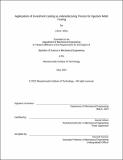| dc.contributor.advisor | Gilbert, Daniel | |
| dc.contributor.author | Wine, Lila N. | |
| dc.date.accessioned | 2022-08-29T15:51:00Z | |
| dc.date.available | 2022-08-29T15:51:00Z | |
| dc.date.issued | 2022-05 | |
| dc.date.submitted | 2022-06-14T19:35:44.096Z | |
| dc.identifier.uri | https://hdl.handle.net/1721.1/144490 | |
| dc.description.abstract | An exploration in the utility of investment casting aluminum molds for small-scale plastic injection molding, compared against traditional machining methods for these molds. The intention of this study was to determine if lost wax casting could provide a more efficient option for tool manufacturing. Complex patterns were designed and 3D printed using castable resin, following manufacturers specifications. Various parameters throughout each step of the casting process, such as part design, 3D print settings, and investment procedures were altered to determine their effect on the end result. In the end, more time is necessary to achieve the desired results given the resource limitations of this study. Investment casting could still be a viable option for this type of tooling, given adequate time and resources to optimize each parameter and create a highly repeatable process. | |
| dc.publisher | Massachusetts Institute of Technology | |
| dc.rights | In Copyright - Educational Use Permitted | |
| dc.rights | Copyright MIT | |
| dc.rights.uri | http://rightsstatements.org/page/InC-EDU/1.0/ | |
| dc.title | Applications of Investment Casting as a Manufacturing Process for Injection Mold Tooling | |
| dc.type | Thesis | |
| dc.description.degree | S.B. | |
| dc.contributor.department | Massachusetts Institute of Technology. Department of Mechanical Engineering | |
| mit.thesis.degree | Bachelor | |
| thesis.degree.name | Bachelor of Science in Mechanical Engineering | |
